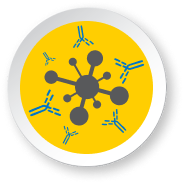
About Primary Humoral
Immunodeficiency (PI)
WHAT IS PI?
PI occurs when a person’s immune system doesn’t work correctly or when parts of the system are missing. As a result, the immune system can’t make enough antibodies to fight infections effectively.
Antibodies are small proteins that target invading germs, including
bacteria and viruses.

HOW COMMON IS PI?
The exact prevalence of PI is unknown. In the United States, it is estimated that 1 in 2,000 children and 1 in 600 households are diagnosed with PI. Patients with PI often get one infection after another. These infections may never really improve as expected and may recur over time.
150,000 to 360,000
PEOPLE ARE DIAGNOSED WITH PI
Source: Jiang F, Torgerson TR, Ayars AG. Allergy Asthma Clin Immunol. 2015.
150,000 to 360,000
PEOPLE ARE DIAGNOSED WITH PI
Source: Jiang F, Torgerson TR, Ayars AG. Allergy Asthma Clin Immunol. 2015.
WHAT CAUSES PI?
There’s no single cause. Many PI disorders are inherited, which means that the condition is passed down from one or both parents. Some immune system defects are caused by genetic factors in a person’s DNA. At one time, it was thought that PI was a disease of infants and small children. Now we know the symptoms of PI can appear later in life.
The following list shows 10 warning signs of PI.
You may have experienced one or more of them.

within 1 year
.png?width=67&height=80&name=Isolation_Mode%20(1).png)
infections within 1 year
.png?width=58&height=80&name=Isolation_Mode%20(2).png)
antibiotics with little effect
.png?width=89&height=80&name=Isolation_Mode%20(3).png)
within one year
.png?width=90&height=80&name=Isolation_Mode%20(4).png)
or grow normally
.png?width=119&height=80&name=Isolation_Mode%20(5).png)
abscesses
.png?width=104&height=80&name=Isolation_Mode%20(6).png)
fungal infection on skin
.png?width=82&height=80&name=Isolation_Mode%20(7).png)
to clear infections
.png?width=97&height=80&name=Isolation_Mode%20(8).png)
infections, including septicemia
.png?width=60&height=80&name=Isolation_Mode%20(9).png)
WHAT ARE SOME WAYS TO HELP PREVENT INFECTIONS?
There is no way to prevent primary immunodeficiency disorders because their causes are genetic. But you can take steps to help prevent infections that can occur due to a weakened immune system. Discuss the tips below with your doctor before giving them a try.
.png?width=85&height=85&name=Frame%20(6).png)
Wash your hands regularly
Especially after being in public, and before eating
.png?width=85&height=85&name=Frame%20(10).png)
Eat a healthy diet
Follow your doctor’s recommendation for a balanced diet
.png?width=85&height=85&name=Frame%20(7).png)
Set a sleep schedule
Try to get the same number of hours of sleep every night
.png?width=85&height=85&name=Frame%20(11).png)
Stay active
With your doctor’s approval, try light exercise – it may improve your overall health
.png?width=85&height=85&name=Frame%20(8).png)
Practice good oral hygiene
Brush your teeth at least twice a day, and floss every night before bed
.png?width=85&height=85&name=Frame%20(12).png)
Limit exposure to illness-causing germs
Don’t give up your pandemic habits. Avoid people who are sick and practice social distancing
.png?width=85&height=85&name=Frame%20(9).png)
Reduce stress levels
By exercising, meditating, or setting a sleep schedule. High stress levels can affect your immune system

Ask your doctor about vaccines
Make sure you’re up to date on the vaccinations you need
HOW IS PI TREATED?
One of the most common treatments for PI is immune globulin (Ig) replacement. Ig is a component of plasma. Plasma is the yellow-colored liquid left over when red blood cells are removed from whole blood that is donated by people with healthy immune systems. Ig is removed from the collected plasma and purified. It is then used to treat a variety of conditions, including PI.
Ig treatment can improve the health and quality of life for many patients with PI

Fewer respiratory tract (lung) infections

Less time spent in the hospital

Fewer missed work/school days